I don't often do multiple reviews in one post, but, as I mentioned here, I am a bit behind with reviews, including a couple of books I read several months ago, so this time around it's easier to put a few together in one post. Let me know what you think!
Little by Edward Carey (2018)
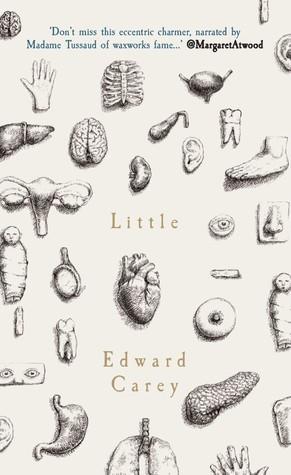
I read this in November 2018, and I have no idea why I didn't review it at the time. I think finding out I was pregnant, along with Christmas and a trip to Switzerland in December all got in the way! The important thing is that I loved this novel - I loved the writing style, the quirkiness, the history and settings, and I loved the character of Marie. I loved her way of looking at things a little askew, her never accepting anything as granted or given, and her perseverance. I especially enjoyed her relationships with those around her, particularly Curtius and the princess Elisabeth. Carey's writing is vivid and tangible, and you get a real sense of the world in which Marie lives and her experience of it. Highly recommended.
The Three Escapes of Hannah Arendt: A Tyranny of Truth by Ken Krimstein (2018)
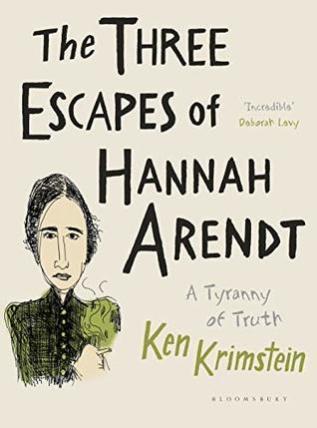
I first came across Hannah Arendt at university, when we read her book Eichmann in Jerusalem for a course on literatures of genocide. Since then I haven't actually read any more of her books (although I have a copy of On Revolution somewhere on the shelves) but I have read about her and always wanted to read more. I think I saw The Three Escapes on GoodReads at first, and it was the graphic novel format that initially intrigued me. Krimstein's artwork is engaging and vivid, with lots of urgency and movement or, when required, real stillness. It's quite a rough style that took me a while to get into, but it actually really works for this story. The book is a sort of biography of Arendt, framed with her escapes firstly from her hometown to her adult life in Berlin, then from Nazi Germany, and then from Europe entirely. There are a lot of philosophical discussions and debates, often between Arendt and others, and often just with herself. I felt like I really learned something and came away wanting to read more about Arendt and her philosophy, but also that of the other people featured in the book. Loved it.
The Burning Chambers by Kate Mosse (2018)
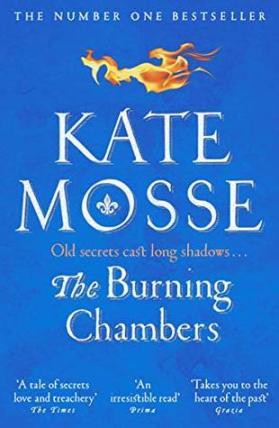
I read The Burning Chambers in April of this year and sort of tore through it. I'd never read Kate Mosse before but just quite fancied a big book to get stuck into, and I saw this at the supermarket. Mostly it appealed to me because I knew almost nothing about the period of history in which it's set, 16th century France. I also knew nothing about the Wars of Religion that fuel much of the plot. The central story is a personal one of secrets carried through generations that are slowly teased and revealed to the reader, but the Wars create a dramatic backdrop that push the action forward. The central character is the teenage Minou, who seems to spend the whole novel running around trying to solve everyone else's problems while she is in fact the centre of the family story the entire time, even if she doesn't know it. There is a prologue set in South Africa in 1862, and this teases the fact that this is the first book in a trilogy, and Minou's story is only the beginning of a much longer saga. I'm not really big on book series, but I probably will read the next instalment, The City of Tears, when it comes out next year. I'm sure it'll be just as much of a romp as this book.
The Work I Did: A Memoir of the Secretary to Goebbels by Brunhilde Pomsel and Thore D. Hansen, trans. Shaun Whiteside (2017)
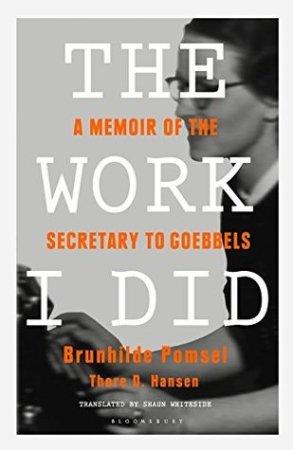
Brunhilde Pomsel was, as the title suggests, a secretary to Joseph Goebbels, the Nazi propaganda minister, and she told her story for the 2016 documentary A German Life (which is now a play with Maggie Smith). This book is made up of a transcript of that story, told by Pomsel, and then ends with a commentary by the journalist Thore D. Hansen on what was can learn from that story. Pomsel's main assertion is that at the time she was 'apolitical', mostly because when she first got a job at the Reichsbund in the 1930s, before the war, she had only just finished school and simply needed a good job, and this one was recommended to her by an acquaintance. She was young and naive and though she knew that the National Socialist party was very right-wing, she says that politics were never discussed within her family, and she didn't care about the party that much - she just needed a job to get her started. Pomsel was then transferred over the Propaganda Ministry without choosing to do so, and it was only once she was there that she started to learn more and realise what the Party were really doing. The fact that the memoir section is taken from her speaking rather than writing means that it's quite engaging, if a little meandering, and I liked the fact that you get a real sense of her own experience. She told her story in the last couple of years of her life, in her 90s, so her memory fails at times, but you get the overall picture. She was thrown into this world that she didn't understand and that ended up being more significant than she could have known at the time. It's a fascinating story. Less fascinating was Hansen's section at the end of the book - for me at least. He speaks initially about what we can learn from history about the rise of right-wing politics and parties in our own time, and how we can make a difference. Personally I thought he put too much emphasis on the individual, especially when he applied this to the time of the Nazis. My main issue was that he refused to believe that Pomsel didn't initially, or fully, understand the extent of the Nazis' persecution of Jewish people and other groups they opposed. Pomsel says that she slowly realised that Jewish people had their rights taken away and that they started to 'disappear' but she initially believed the propaganda that they were just being moved elsewhere to live. I think it's fair that she didn't know the full extent of all this at the start at least, because hardly any ordinary people did. Only later does it become apparent to her. Hansen also refuses to believe the Pomsel should feel no guilt, as she says more than once. This particularly annoyed me as she was just a typist with no power at all, and though she worked in Goebbels' office she didn't work with him directly and only knew him as her boss, not on a personal level. She had an administrative job, very low down the chain, and did not facilitate any of the Nazis' infrastructure directly - they could still have done what they did without her there. Over the years she has obviously wrestled with the question of guilt herself and concluded that none of it was up to her, which I think is fair. Hansen obviously wrote his section of the book with a very specific agenda, set against Pomsel, and for me this ruined the whole thing. She tries to take a balanced view, as much as she can, and I think he should have as well. I think his own politics come into it too much. So, a very mixed experience for me reading this book. Not for everyone, I think.
The Favourite: Sarah, Duchess of Marlborough by Ophelia Field (2002, reissued 2018)
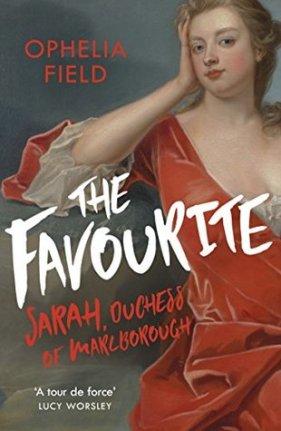
I have been meaning to see the movie version of this book (still haven't got around to it) so I thought in the meantime I may as well read about the actual history behind it. The trailers for the movie are certainly intriguing, showcasing an unusual and interesting dynamic between Queen Anne and Sarah. I didn't really know anything about either of them beforehand, but I was eager to find out more. And while their relationship forms a big section of this biography, it is really the story of Sarah's whole life, so don't go in expecting it to just be like the film. We learn a lot about Sarah's husband Lord Marlborough and his military career and its impact on English politics, with which Sarah was very involved and influential. Really this book is more about politics than almost anything else, as that was a huge part of Sarah's life, right up until her death. This was very interesting, but for me it was a bit heavy-going, and I felt like I needed a better understanding of the parliamentary system at the time to really appreciate it. I preferred the personal side of Sarah's story, and you really do get a sense of her personality, much more so than in other historical biographies I have read, and Field points out that this is because she was obsessed with her reputation and how she would be remembered - so she left a lot of her writing and diaries with notes and comments to explain how she really felt and acted. She is certainly a fascinating and important figure in our history, but I think the political side of this biography should be given more emphasis because you get a lot of it, more than I was expecting.
*
So there you have it - a snapshot of some of my recent reads. You can't say I don't have varied interests...
[All images are from GoodReads.com]
